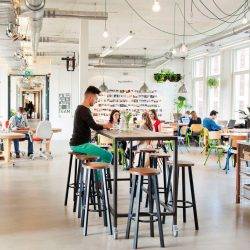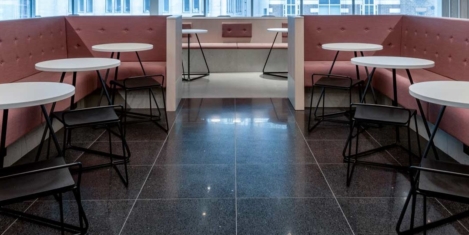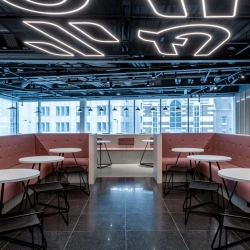To provide the best experiences, we use technologies like cookies to store and/or access device information. Consenting to these technologies will allow us to process data such as browsing behaviour or unique IDs on this site. Not consenting or withdrawing consent, may adversely affect certain features and functions.
The technical storage or access is strictly necessary for the legitimate purpose of enabling the use of a specific service explicitly requested by the subscriber or user, or for the sole purpose of carrying out the transmission of a communication over an electronic communications network.
The technical storage or access is necessary for the legitimate purpose of storing preferences that are not requested by the subscriber or user.
The technical storage or access that is used exclusively for statistical purposes.
The technical storage or access that is used exclusively for anonymous statistical purposes. Without a subpoena, voluntary compliance on the part of your Internet Service Provider, or additional records from a third party, information stored or retrieved for this purpose alone cannot usually be used to identify you.
The technical storage or access is required to create user profiles to send advertising, or to track the user on a website or across several websites for similar marketing purposes.
 Data from thousands of employees across the country has been aggregated in a new report, detailing the mental wellbeing of the workforce over the course of the year. The research from 87 percent, a digital platform that provides mental health assessment and support to businesses and their employees, shows how the workforce has struggled with the mental pressures of Covid-19. Since March, circumstances at work and pressures in our personal lives have badly affected our mental wellbeing. (more…)
Data from thousands of employees across the country has been aggregated in a new report, detailing the mental wellbeing of the workforce over the course of the year. The research from 87 percent, a digital platform that provides mental health assessment and support to businesses and their employees, shows how the workforce has struggled with the mental pressures of Covid-19. Since March, circumstances at work and pressures in our personal lives have badly affected our mental wellbeing. (more…)






 The pandemic has shaken up business priorities and many predict that it will continue to have lasting influence on the future direction of organisations. It is predicted that innovation and more compassionate leadership will take centre stage, according to a new study by ‘
The pandemic has shaken up business priorities and many predict that it will continue to have lasting influence on the future direction of organisations. It is predicted that innovation and more compassionate leadership will take centre stage, according to a new study by ‘
 Research published by
Research published by 
 Employee monitoring is an emotive topic. Businesses may wish to monitor their staff for a variety of reasons. For instance, they may wish to prevent the unauthorised disclosure of confidential or sensitive information, or detect attempts to steal valuable intellectual property. In the current conditions, dominated by the coronavirus pandemic, many businesses have opted to use automated means to monitor staff productivity. However, from an employee’s perspective, the use of monitoring software may be intrusive if not distressing. Further, if it has been implemented without regard to data protection law, it is potentially illegal.
Employee monitoring is an emotive topic. Businesses may wish to monitor their staff for a variety of reasons. For instance, they may wish to prevent the unauthorised disclosure of confidential or sensitive information, or detect attempts to steal valuable intellectual property. In the current conditions, dominated by the coronavirus pandemic, many businesses have opted to use automated means to monitor staff productivity. However, from an employee’s perspective, the use of monitoring software may be intrusive if not distressing. Further, if it has been implemented without regard to data protection law, it is potentially illegal. 
 2015. It is perhaps the most common misconception of evolutionary theory that all animals are somehow evolving towards some end point – meaning us. This notion is perhaps best summed up when a sceptic asks: “If we have evolved from monkeys, why are there still monkeys?” The lesser of the two problems with this is its solipsistic assumption that humans are the pinnacles of life and that, if evolution were true, all species would eventually evolve into people.
2015. It is perhaps the most common misconception of evolutionary theory that all animals are somehow evolving towards some end point – meaning us. This notion is perhaps best summed up when a sceptic asks: “If we have evolved from monkeys, why are there still monkeys?” The lesser of the two problems with this is its solipsistic assumption that humans are the pinnacles of life and that, if evolution were true, all species would eventually evolve into people. 
 Productivity, morale and the ability to serve customers are being hamstrung by technology issues at European mid-size businesses, accordingly to research commissioned by
Productivity, morale and the ability to serve customers are being hamstrung by technology issues at European mid-size businesses, accordingly to research commissioned by 
 Heightened anxiety during the Covid-19 pandemic has led to employees working longer hours and taking fewer sick days, all the while becoming less fulfilled by work and life, according to the latest analysis from
Heightened anxiety during the Covid-19 pandemic has led to employees working longer hours and taking fewer sick days, all the while becoming less fulfilled by work and life, according to the latest analysis from 
 With many continuing to work remotely for the foreseeable future, new insights from
With many continuing to work remotely for the foreseeable future, new insights from 
 When Donald Trump was
When Donald Trump was 
 In the face of the revolutionary and long-lasting changes to workplaces across the world resulting from the pandemic, some commentators have suggested that the wide-spread necessity of adopting remote working practices may have made the office obsolete. However, such a dramatic upheaval to the very foundation of the workplace and working dynamic won’t come without a cost, and new data suggests that perhaps the office isn’t the dinosaur many assumed, but still a central pillar to effective businesses as part of a hybrid working strategy.
In the face of the revolutionary and long-lasting changes to workplaces across the world resulting from the pandemic, some commentators have suggested that the wide-spread necessity of adopting remote working practices may have made the office obsolete. However, such a dramatic upheaval to the very foundation of the workplace and working dynamic won’t come without a cost, and new data suggests that perhaps the office isn’t the dinosaur many assumed, but still a central pillar to effective businesses as part of a hybrid working strategy. 
 A new think tank has launched today to mark the United Nations’ International Day of Persons with a Disability. Called ‘
A new think tank has launched today to mark the United Nations’ International Day of Persons with a Disability. Called ‘







December 18, 2020
The shape of things to come for the world and the workplace
by Mark Eltringham • Comment, Flexible working, Technology, Wellbeing, Workplace design